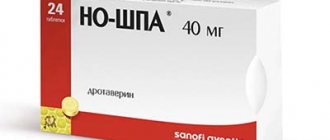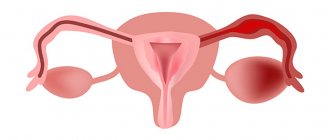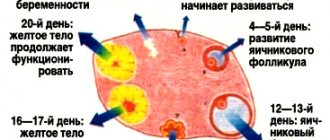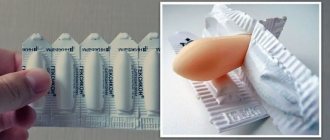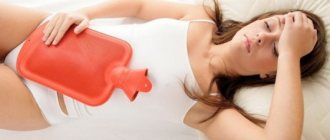Different phases of the menstrual cycle have different effects on a woman's well-being. During some periods there is an increase in appetite and a change in mood, while during PMS there is a nagging pain in the abdomen. There are often complaints from women that they have a headache after menstruation. As a rule, this is due to changes in hormonal levels at the end of menstruation. However, in some cases it makes sense to check with a cardiologist or neurologist.
Sometimes girls complain of headaches after menstruation
What changes are observed in the body
Headache after menstruation is characterized as a migraine that suddenly appears. The pain is localized in the temporal part and right or left frontal. It is often pulsating, can be pressing, quite intense, and can also be accompanied by the periodic appearance of spots before the eyes, dizziness or nausea. An understanding of the changes in the body associated with the cycle helps to understand why a headache occurs after menstruation.
After menstruation, hormonal levels change in the body. During ovulation, the level of estrogen and progesterone increases, because... conception is expected. But the egg is not fertilized, and accordingly, the level of these hormones decreases. At the same time, the elasticity of the walls of blood vessels decreases, they expand and the pressure decreases, so after menstruation you feel nauseous and have a headache.
Such symptoms may be disturbing due to changes in the level of testosterone (which women have) in the blood. Jumps of this hormone, on the contrary, increase blood pressure, heart rate increases, which can lead to nausea and headaches.
Lower abdomen hurts and nausea after menstruation and
During menstruation, the girl experiences discomfort. The cycle lasts one to six days, depending on the individual characteristics of the body and external circumstances.
The unfertilized egg is rejected by the body and the lining of the uterus separates, causing bleeding. Women keep a monthly calendar, anticipating the onset of an unpleasant period.
Hormonal changes during menstruation are a natural process. You can avoid the onset of critical days during pregnancy and lactation.
When pain is a physiological sign
Not all women experience headaches after menstruation. If for a woman this is a constant sign that appeared with the establishment of a regular cycle, then there is no need to sound the alarm and look for pathology in this. Normally, the pain should not last more than a day, and should subside or stop after taking the pill. If the syndrome is intense, then it significantly affects performance and is accompanied by additional undesirable symptoms. This indicates a malfunction in the body.
If the pain is severe and does not go away, you should consult a doctor
Factors affecting the menstrual cycle
- change of season;
- climate change;
- after childbirth;
- taking contraceptives.
If for some reason the menstrual cycle is interrupted or does not occur, at a certain age. This may indicate problems in the functioning of the female body. The sooner you pay attention to this problem, the greater the opportunity to correct it.
Menstruation usually begins before the age of fifteen. Its duration and frequency: every month for three to seven days - this is considered the norm. There may be some hiccups in the process of life. The menstrual cycle can change the timing of its manifestation.
The processes occurring in the female body also have an impact on the menstrual cycle:
- pregnancy;
- intrauterine device;
- gynecological diseases;
- serious illness of the body.
What you need to pay attention to:
- sudden change in the menstrual cycle;
- a sharp change in its duration;
- changes in fluid secretion during menstruation;
- absence of menstruation for six months;
- severe headaches and pain in the lower abdomen;
- frequent disruptions of the menstrual cycle;
- discharge between periods.
To keep track of your menstrual cycle, you can keep a calendar where you can mark its beginning and end. Make any notes that will help you analyze your feelings.
All this is very individual. Some women endure such periods almost painlessly, but sometimes the onset and course of menstruation is quite painful.
When pain is a sign of illness
Pain doesn't have to be constant. If this happens, then you should check with a doctor. The disease of which organ leads to painful headaches is presented in the table.
| Organ | Localization of pain | Description |
| central nervous system | Whiskey, nape | Deviations in the functioning of the central nervous system develop for various reasons and are not related to menstruation. Against the background of hormonal fluctuations after menstruation, pathology worsens, so a woman feels nauseous and has a headache during her menstruation. It is recommended to be examined in order to take measures and prevent the development of serious diseases. You may need to take sedatives and B vitamins. |
| Kidneys | Back of the head | Inflammation of the kidneys, infections, sand or stones, chronic pyelonephritis, poor nutrition lead to the inability of the kidneys to remove all excess water from the body. In this case, swelling of various localizations occurs. Against this background, blood pressure rises and health worsens. |
| The cardiovascular system | Migraine, pain behind the eyes, in the cheekbone | Under the influence of hormones, blood pressure decreases or increases. If the vessels are clogged with cholesterol plaques, the blood is too thick, the vessels are fragile or not elastic enough. A spasm occurs and severe pain in the head begins. Also, with varicose veins, the period after menstruation is accompanied by pain and nausea. Associated symptoms are a feeling of lack of oxygen, any room seems stuffy, there is a craving for coolness, weakness, drowsiness, trembling, rapid heartbeat with a noticeable strong pounding, coinciding with the pulsation of a migraine. |
| Pelvic organs | Migraine | Inflammation or infection of the vagina, appendages, ovaries or uterus leads to poor health after menstruation. The pathological process serves as intoxication to the woman’s body, so it is important to consult a gynecologist for treatment. |
Nausea after menstruation: what could it be, the main reasons
During menstruation, the girl experiences discomfort. The cycle lasts one to six days, depending on the individual characteristics of the body and external circumstances.
The unfertilized egg is rejected by the body and the lining of the uterus separates, causing bleeding. Women keep a monthly calendar, anticipating the onset of an unpleasant period.
Hormonal changes during menstruation are a natural process. You can avoid the onset of critical days during pregnancy and lactation.
Changes in a woman's body
The inconveniences experienced by female representatives during menstruation interfere with the normal flow of life. Loss of strength, malaise, and capricious mood are closely associated with hormonal fluctuations. Girls experience temporary difficulties with symptoms accompanying menstruation:
- Dizziness (associated with low blood pressure);
- Nausea (release of hormonal enzymes into the blood);
- Swelling of the mammary glands and abdomen;
- Increase, decrease in body temperature;
- Rashes on the skin of the face, neck, shoulders;
- Headache.
Additional unpleasant phenomena during menstruation
A failure in the body’s systems does not pose a threat to the girl’s health; the hormonal levels are restored over time. What can prevent you from leading a normal rhythm of life during an inevitable period for a woman:
- Stomach upset;
- Problems with stool;
- A nagging pain appeared in the lower back and abdomen;
- Decreased appetite;
- Attacks of nausea, possibly vomiting;
- Irritability, decreased activity;
- Brown, whitish discharge.
Menstruation is associated with the production of prostaglandin. The hormone affects muscle fibers and the circulatory system. Blood clotting decreases, muscles are toned.
Prostaglandin spasms the uterus, the girl feels sick. The substance affects the nervous system, causing pain in the lower abdomen and a gag reflex.
The body experiences severe dizziness, swelling of the legs and other troubles.
Nulliparous girls are more often susceptible to the negative influences of hormones. The state of the body is affected by the structure and deviation of the uterus from the norm. The individual characteristics of the organ upset the balance of progesterone, estrogen and prostaglandin. After childbirth, nausea and vomiting during menstruation disappear.
Severe discomfort during and after menstruation
What should a woman do to relieve nagging pain and maintain balance? In a week, your period will pass, relatives and colleagues will be impressed by the emotional behavior of a woman experiencing the “beauty” of the natural process.
During menstruation, you should not set sports records or subject your body to physical activity. Sudden movements aggravate the natural process. The girl feels dizzy and her vision darkens. The rhythm of life does not allow Russian women to relax, to take a quiet walk in the fresh air, taking a break from the hustle and bustle. Weakness and nausea are the result of constant haste.
Often, the girl herself has a hand in the accompanying signs of menstruation, abuses junk food, bad habits, or carries weights, provoking pain. It is prudent to limit excesses in nutrition. Choose healthy foods that contain fiber and healthy nutrients.
Eating salty, spicy foods disrupts water-salt metabolism. The body becomes dehydrated, requiring replenishment of water. Excess moisture in tissues and organs leads to edema and increased blood pressure. As a result, the head becomes heavy and hurts.
A female representative faints.
Nausea after menstruation
If nausea does not subside a week after the bleeding stops, the girl needs to think about nutrition, the amount of fluid consumed before and during menstruation, work and rest schedule.
A woman does not experience joy when her critical days coincide with national and state holidays. The diet is getting out of control, the girl indulges in excess on a holiday.
There may be independent reasons in the life of ladies.
What leads to nausea after your period ends?
- Stressful situations. Moral burnout associated with stress at work and family circumstances is tiring. Nervous feelings, anxiety and difficulties in relationships cause nausea and headaches. Vomiting occurs.
- Oral contraceptives. Incorrectly selected hormonal medication has a side effect – nausea after menstruation. Taking the drug (starting taking it) coincides with the end of menstruation. The nauseating state is accompanied by headaches, aggressiveness, and indigestion.
- Pregnancy. The situation is ambiguous. The woman decides whether to enjoy the event or not. Rarely does a woman think about the signs of pregnancy when her period appears at the expected time and ends on time. Sometimes the situation is associated with slight bleeding in the early stages, strongly reminiscent of menstrual flow. The woman decides what to do next after consulting a doctor.
- Deviation of the uterus. The location of the uterus does not threaten the girl’s health and future motherhood. But it provokes nausea after menstruation. The uterus is enlarged, pressing on neighboring organs and nerve endings. These impulses cause physiological discomfort; a woman may have pain in the lower back, stomach or head. The pain goes away over time.
How to deal with nausea after your period
It is better to remain calm and wait for the body to regain strength. If the cause of unpleasant health is not external circumstances, then the natural processes of the body will soon return to normal. Provoking factors are eliminated to help the body cope with the load. Nervous shocks, exercise and rich food can wait.
A girl who is interested in yoga and gymnastics will bypass the malaise. Spiritual practices will bring comfort and peace to the psychological state.
Physical relaxation during menstruation and when menstruation ends normalizes the functioning of the genitourinary and circulatory system. To relieve headaches and nausea, take a pill approved by your doctor.
No-spa and spasmalgon will help relieve spasms. Nerve cells are calmed by herbal infusions (melissa, chamomile, valerian).
Why do women suffer?
Monthly blood loss makes women experience discomfort. The menstrual cycle is the first process from which a woman cannot escape. Tolerating unpleasant sensations is not a pleasant pleasure, so escape routes are prepared in advance. If you properly tune in to the physiological test, then the woman will easily endure minor changes in the body.
In order for a lady to remain in high spirits and maintain her ability to work, she should follow simple rules and not abuse rich food, alcohol, or harmful foods. This will not require spending any money.
Will set you up for the upcoming period with moral preparation. If maintaining a healthy lifestyle does not help prevent nausea, you should seek the help of a doctor.
A possible disease occurs in a latent form, diagnosis is half the success.
If nausea and vomiting after menstruation signal an imminent addition to the family, then the disease has nothing to do with it. It's time to accept congratulations.
Source: https://GastroTract.ru/simptom/toshnit/posle-mesyachnyh.html
Dangerous signs of deviations
Headache attacks that appear after menstruation may not be associated with the menstrual cycle. Sometimes this sign indicates serious abnormalities in the body. One of these is cytomegalovirus. This is a virus related to herpes. If an infection occurs, short-term cramps occur in the muscles, migraines torment, and pain in the eyes due to damage to the optic nerve occurs.
The virus leads to kidney disease, anemia, causes fetal deformity and provokes miscarriage.
With prolapsed uterus syndrome, due to constipation that occurs for this reason, a large amount of toxic substances accumulate in the blood. Therefore, after menstruation, nausea appears and the temporal part of the head hurts.
If seizures occur, check for the presence of cytomegalovirus in the blood
If the pain does not go away for more than two days, the tonometer shows the same values both before and after taking the medicine, nausea or swelling appears, urination rarely occurs, speech is inhibited, you should immediately go for examination.
What examinations to undergo
If you are concerned about pain after menstruation, it is recommended to consult a gynecologist about this problem. The doctor will order a test to determine your hormone levels. If there are certain deviations, they are corrected with medications. If there are no problems in gynecology, you should make an appointment with a neurologist. The doctor will assess the state of the patient’s nervous system and, if necessary, prescribe sedatives and vitamin therapy.
Sometimes an MRI of the brain is required to rule out neoplasms.
When to start treatment
Any doctor will definitely say that self-medication can have harmful consequences. If the pain bothers you only one day after your period, then you can take a medicine that relieves spasms and pain. Treating a pathology without knowing what causes it is pointless and dangerous. Medications must be prescribed by a doctor after receiving the examination results.
Uncontrolled use of drugs is prohibited
Many women self-medicate by taking painkillers without consulting a specialist. Thus, they temporarily stop feeling pain, and the problem only grows. If migraines become more frequent after the menstrual cycle, you should consult a gynecologist, and then, possibly, a neurologist. There is a high probability that they will schedule an appointment:
- antimigraine drugs;
- hormonal drugs when hormonal imbalance is detected;
- vitamin complexes, when the body is weakened;
- antibiotics or anti-inflammatory drugs, if the pain is associated with inflammation of the genitourinary system;
- drugs that normalize blood flow and improve the structure of blood vessels.
It is very important to switch to a healthy diet, eliminating fat and sugar, since these two products clog blood vessels and cause pain.

